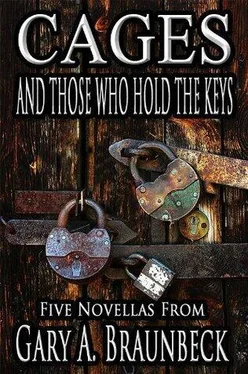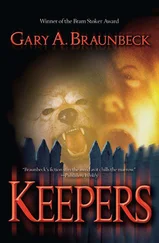“Got it that time, didn’t we?” he said. He reached out with an unsteady hand and grasped Marian’s arm.
“Thank you both very much,” he said. “Now go.” There was a hideous sound from below his waist as his ruined bowels exploded.
Marian grabbed Alan and went back out, closing the door behind them. They stood there for a moment listening for him in case he needed more help.
“You two can go about your Christmas wrappin’ business,” he said. “I’m almost eighty years old and I been in worse situations than this. I got me no intention of dying on a goddamned toilet seat. Now move along.” They were heading back upstairs for the paper and the tape when Alan squeezed her hand and said, “He’s so sad.” “He’s just sick,” replied Marian. “He’ll be better.” “I don’t want him to feel sad. I love him.” Marian looked at her brother and shook her head. “I love him, too. But I don’t think that’s enough to make him not sad anymore.” Alan looked heartbroken. “Not even a little?”
Marian shrugged. “Maybe a little. But what good’s that , what good is a little?”
A few days later Grampa insisted that he was well enough to go do his own Christmas shopping, and Marian’s mother made no attempt to stop him. When he came back with all the presents his check allowed him to afford he told everyone that he’d bought himself— of all
things— a 45 r.p.m. record of some Neil Diamond song.
“I never bought a record before, but they was playing’ this in the store where I was shopping and it was kinda pretty (which he pronounced ‘purdy’) so I bought it.” After dinner when Mom was doing the dishes he went into the front room and put the record on Mom’s old table-top hi-fi, then sat in the reading chair and listened to it. Marian stood in the doorway and watched Grampa as he closed his eyes and leaned back in the chair and seemed to... deflate like a balloon, sort-of, just a little bit.
She didn’t say anything because he looked tired, so she just stood there and listened to the record. It was a song called “Morningside” and it was about this old man who lived alone and had no friends and when he died no one cried, and then people went to collect his things and they found this table he’d been building for a long time, and it was a beautiful table, the most beautiful table any of them had ever seen, and when they were moving it, they turned it upside-down and saw that he’d written a message underneath it that said for my children .
It was the saddest and most awful depressing song Marian had ever heard; sadder even more than “Puff, the Magic Dragon.”
When the record was over the arm lifted up and swung back and set itself back down, the needle easing into the grooves with a brief clikkity-click before the song started again.
Grampa opened his eyes and rolled his head over and saw Marian standing there.
“That’s kinda pretty in a...in a way, ain’t it?” he asked, gesturing for her to climb up on his knee.
“Yes, it is,” she said. And that wasn’t a lie; it was pretty, but it was sad, too, and Marian didn’t understand how something could be so sweet and so depressing at the same time.
Later that night Grampa was lying in his bed in the middle room and asked Mom if he could have a while alone with Marian and Alan. Mom said sure and kissed him goodnight. It was the first time Marian could remember seeing her mother kiss Grampa.
After Mom went to bed Grampa told Alan to go get him a small a can of soda pop and some chips, he was going to tell them a special story. When they were all situated and sipping away, he began.
“I wasn’t too good to your mother when she was a little girl,” he said. “I was young and had all this Get Up and Go. I liked to drink me a mighty good time, I did...so I’s never around much. That’s probably why your Grandma and me never made it. I left her to take care of your mother all by herself. That was back during the Depression. Thing’s weren’t good for a woman with a kid and no husband then. County had to finally take your mother away and put her in a children’s home for a few years...until your Grandma could get enough money to give her a proper upbringing.
“Anyway...that ain’t got a lot to do with what I wanted to tell you, but I seen the way you two’ve been watching me and your mother, and I know you’re not stupid kids so you were probably wondering. I just thought you ought to know.” He reached down under the blankets and took out a bottle. It was like no other bottle Marian had ever seen. It was made out of stone, and stoppered with an old cork. She was about to ask what it was but then Grampa started talking again; and all the time, his finger kept stroking the bottle’s stone surface. “I got myself shot overseas during the war and it did something to the bones in my leg and the doctors, they had to insert all these pins and build me a new kneecap and calf-bone—it was awful. Thing is, when this happened, I only had ten months of service left. I was disabled bad enough that I couldn’t return to combat but not so bad that they’d give me an early discharge, so they sent me back home and assigned me guard duty at one of them camps they set up here in the states to hold all those Jap-Americans.
“I guarded the gate at the south end of the camp. It was a pretty big camp, kind of triangle-shaped, with watchtowers and searchlights and barbed wire, the whole shebang. There was this old Jap tailor being held there with his family and this guy, he started talking to me during my watch every night. This guy was working on a quilt, you see, and since a needle was considered a weapon he could only work on the thing while a guard watched him, and when he was done for the night he’d have to give the needle back. Well, I was the guy who pulled ‘Needle Patrol.’
“The old guy told me that this thing he was working on was a ‘memory quilt’ that he was making from all the pieces of his family’s history. I guess he’d been working on the thing section by section for most of his life. It’d been started by his great-great-great-great-grandfather. The tailor, he had part of the blanket his own mother had used to wrap him in when he was born, plus he had his son’s first sleeping gown, the tea-dress his daughter had worn when she was four, a piece of a velvet slipper worn by his wife the night she gave birth to their son....
“What he’d do, see, is he’d cut the material into a certain shape and then use stuff like paint or other pieces of cloth stuffed with cotton in order to make pictures or symbols on each of the patches. He’d start at one corner of the quilt with the first patch and tell me who it had belonged to, what they’d done for a living, where they’d lived, what they’d looked like, how many kids they’d had, the names of their kids and their kids’ kids, describe the house they had lived in, the countryside where the house’d been...it was really something. Made me feel good, listening to this old guy’s stories, ‘cause the guy trusted me enough to tell me these things, you see? Even though he was a prisoner of war and I was his guard, he told me these things.
“It also made me feel kind of sad, ‘cause I’d get to thinking about how most people don’t even know their great-grandma’s maiden name, let alone the story of her whole life. But this old Jap— ‘scuse me, I guess I really oughtn’t use that word, should I? Don’t show the proper respect for the man or his culture— but you gotta understand, back then, the Japs were the enemy, what with bombing Pearl Harbor and all....
“Where was I? Oh yeah—this old tailor, he knew the history of every last member of his family. He’d finish talking about the first patch, then he’d keep going, talking on about what all the paintings and symbols and shapes meant, and by the time he came round to the last completed patch in the quilt, he’d covered something like six hundred years of his family’s history. ‘Every patch have hundred-hundred stories.’ That’s what the old guy said.
Читать дальше












